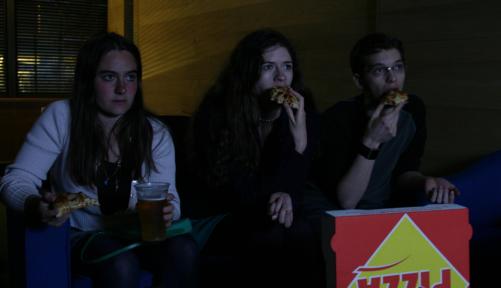The development of the TV dinner
Those who would rather stretch out in front of Neighbours with a box of Micro Chips than sit down at the kitchen table can now console themselves with the idea that they are simply a product of their time in the natural evolution of human dining.
According to Cambridge archaeologist Professor Martin Jones, the TV dinner is simply a case of a new “virtual campfire” around which humans congregate while they eat.
We are now part of a “global community” with events from across the world affecting our day-to-day lives. It is only natural to have progressed from the dining table to the television, which provides a new feed of information and social contact, like a global table to sit around with many more voices sharing stories.
Jones uses archaeological evidence to explain the phenomenon of social dining in humans, an anomaly setting us apart from the rest of the primate kingdom.
 Employing evidence spanning thousands of years of communal eating, he argues that the phenomenon emerged from a need to cooperate while hunting and gathering food. As the human brain evolved, this campfire became a place for more complex social exchange within the community.
Employing evidence spanning thousands of years of communal eating, he argues that the phenomenon emerged from a need to cooperate while hunting and gathering food. As the human brain evolved, this campfire became a place for more complex social exchange within the community.
Not all are convinced by the merits of Professor Jones’ observations, Sustain, an alliance for better food and farming, has criticised the theory as “unhelpful”. A spokesman for the group believes that Jones’ suggestion that television is a reflection of positive human development is illogical, citing research to show that increased television viewing causes obesity in children.
But Jones has claimed that this kind of reaction is characteristic of humans moving along the evolutionary path. Certain stages of development may “seem dysfunctional and make people feel uncomfortable at the time”, he said.
The conclusion is a surprising one given the fact that Jones is a parent who encourages his children to sit around the table, rather than the sitting room, for meals. “People are naturally concerned about the dysfunctional aspect of the TV dinner, but if you look at the archaeological record, there has been similar social unease every time our dining habits have changed. The ‘traditional’ dining room setting about which people are so nostalgic now is actually a construct of the 19th century to which people struggled to adjust in a similar way at the time.”
Jones added, “within my time I can see my children’s generation developing another method of eating based around the artefacts that define their culture, perhaps the computer or the mobile phone… It may not be too long before we talk wistfully about the good old days of eating around the television.”
Perhaps the humble television dinner, scapegoat for familial destruction and anti-social behaviour, is simply a blip on our way to better things.
Li Yan
 News / Clare May Ball cancelled11 May 2025
News / Clare May Ball cancelled11 May 2025 Lifestyle / The woes of intercollegiate friendships8 May 2025
Lifestyle / The woes of intercollegiate friendships8 May 2025 Features / Think you know Cambridge? Meet Guessbridge, Cambridge’s answer to Wordle and GeoGuessr10 May 2025
Features / Think you know Cambridge? Meet Guessbridge, Cambridge’s answer to Wordle and GeoGuessr10 May 2025 Arts / ‘So many lives’: a Nobel laureate’s year in Cambridge9 May 2025
Arts / ‘So many lives’: a Nobel laureate’s year in Cambridge9 May 2025 Sport / Cambridge Cruise to Colossal Victory Over Oxford10 May 2025
Sport / Cambridge Cruise to Colossal Victory Over Oxford10 May 2025




